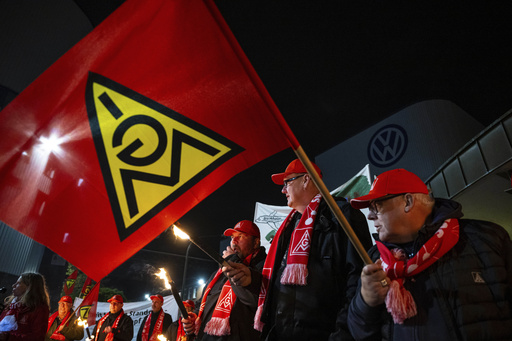
Volkswagen has highlighted the necessity of implementing substantial cost reductions following a significant drop in its earnings during the third quarter. The announcement came on Wednesday as the company faced mounting dissatisfaction from employee representatives over the potential for its first-ever plant closures within Germany.
For the period spanning July to September, Volkswagen disclosed a net profit of 1.58 billion euros, equivalent to approximately $1.7 billion. This figure marks a staggering 64% decline when compared to the 4.35 billion euros reported in the same period the previous year. Meanwhile, revenue saw only a slight decrease of 0.5%, dropping to 78.49 billion euros.
The results were released just two days after the head of Volkswagen’s works council indicated that management had communicated intentions to close at least three production facilities in Germany. However, the company has not made any official comments regarding its specific plans.
Earlier in September, Volkswagen acknowledged the pressures within the automotive sector, which cast doubt on the viability of maintaining operations in Germany. The company also signaled an intention to abandon a longstanding job protection agreement established in 1994 that prohibited layoffs until 2029. This shift is attributed to growing challenges such as emerging competitors in the European market and a declining status for Germany as a manufacturing hub, alongside fierce competition from affordable Chinese electric vehicles.
Chief Financial Officer Arno Antlitz stated that the current financial results reflect the pressing need for prompt actions in an increasingly competitive landscape. He noted that the company must confront crucial and difficult decisions collaboratively. “Although we possess the capability to build exceptional vehicles, the expense associated with our German operations is not competitive at this moment,” he remarked. “Continuing in our current manner is not feasible.”
While maintaining confidentiality regarding discussions with employee representatives, Antlitz refrained from elaborating on any specific plans or rumors. Concurrently, Volkswagen hosted a second round of negotiations at their headquarters in Wolfsburg with union and employee representatives.
Daniela Cavallo, who leads the employee council, emphasized the need for a robust future strategy that goes beyond mere reductions in labor and production costs. “We expect the company to show a willingness to engage in negotiations that aim to explore alternatives to any planned closures and layoffs,” indicated Thorsten Gröger, the regional head of the IG Metall industrial union. He underscored that such discussion is crucial to ensuring the continuation of the negotiation process.
It is important to note that Volkswagen employs around 120,000 individuals across Germany, operating a total of ten plants, six of which are located in Lower Saxony, including the primary facility in Wolfsburg.
